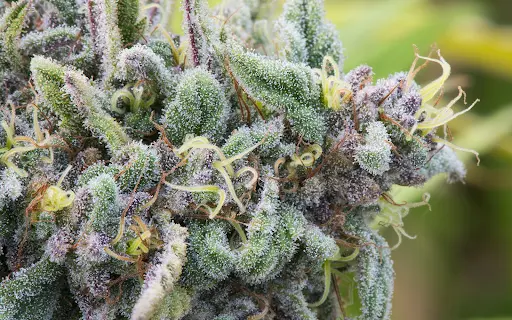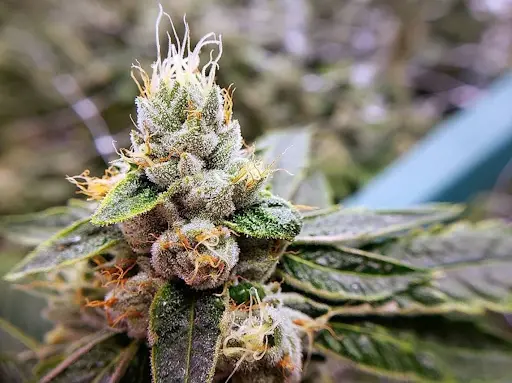OG Kush
What is Kush Made Of: Exploring Cannabis Composition
Kush is a cannabis strain that has been consistently receiving a lot of praise and positive feedback from its users due to its unique qualities and strong effects. But what is Kush made of? It involves the history of Kush, the chemical components, and even the cultivation requirements. Let’s get to know what Kush is made of and the rich history of it.
What is Kush?
The word “Kush” refers to a family of cannabis plants that originated in the Hindu Kush mountain range, which spans portions of Afghanistan, Pakistan, and India. Often characterized as strains that induce a calming, sleep-inducing sensation, they are well-known for their potent effects. The kush bud type is characterized by its resinous buds, which have dense, earthy flavors; one particular type of Kush is a Cherry Kush, which is a classic type that best works at night when you’re feeling late at night or having insomnia. It is also sometimes described as having a woody or even citrusy note. Genetic modification and acclimation processes have produced a variety of Kush subspecies with significant medicinal value and potency. People choose kush because of the powerful effects of the plant, which is one of its primary appeals.
What is Kush Made Of?
Cannabinoids
Kush strains are renowned for their high THC (Tetrahydrocannabinol) content, the primary psychoactive compound in cannabis. This kind of cannabinoid causes a feeling of highness observed in all Kush varieties. Commonly, CBD (Cannabidiol) is present in low quantities in Kush forms, unlike other strains, but still finds its use in different proportions, which have a chance to bring a person back to health because it acts as an anti-inflammatory drug. The balance between THC and CBD in Kush strains determines their overall effects, influencing aspects such as mood elevation and pain relief.

Terpenes
Terpenes are aromatic compounds in cannabis that give it smell, taste, and characteristics. Kush strains have many terpenes, mainly myrcene, limonene, and caryophyllene. Myrcene, common in Indica dominant Kush strains, bring a sedative or calming effect; hence, this variety is capable of causing complete relaxation. Limonene offers a citrusy aroma and may enhance mood and reduce stress, adding a refreshing quality to Kush strains. Caryophyllene, with its spicy and peppery notes, not only enhances the aroma but also offers potential anti-inflammatory benefits, making it valuable for therapeutic use.
Other Phytochemicals
Kush strains are made up of numerous phytochemicals, such as flavonoids and phenols, terpenes, and cannabinoids. The general health advantages of cannabis can also be attributed to the antioxidant characteristics of this active substance. In order to significantly amplify the medicinal power of Kush weed, flavonoids that have anti-inflammatory effects, neuroprotection abilities, and activities should complement THC and CBD. These bioactive molecules are an indication that a more integrated approach abandons mere symptom suppression in favor of prevention efforts. The presence of these phytochemicals underscores the holistic nature of cannabis as a therapeutic plant, offering diverse health benefits beyond its primary cannabinoids.
Genetic Traits
Those living in the Hindu Kush mountain range have ensured that Kush strains stand out from other cannabis strains through continued selective breeding to adapt them to their environment. Such characteristics are evident from the fact that they grow well, are covered in many oily substances when touched, and contain various types of chemicals that differ from these varieties of plants. The genetic resilience of Kush strains reflects their historical cultivation in challenging mountain climates, contributing to their resilience and potency as sought-after cannabis cultivars.
Cultural Significance
Kush strains hold deep cultural significance in cannabis cultivation, rooted in centuries-old traditions and practices. Cultural influences and local customs shape the Kush varieties, producing distinct strains valued for their potency and effects. It goes beyond just being a plant species because of its significance for both recreational as well as medical use, making it a key component of today’s abundance of cannabis breeds.
Genetic Origins of Kush
All Kush strains have one common origin: the Hindu Kush mountain range that crosses parts of Afghanistan, Pakistan, and India. The plant has naturally adapted to these harsh conditions because of the region’s harsh climate and geography. The primary genetic source is thought to be landrace strains, which came down from generations of cannabis plants growing wild in this area without human influence.

The genetic characteristics of Kush strains typically include:
- Indica Dominance: Kush strains exhibit a solid Indica dominance, primarily due to their origins in the rugged Hindu Kush mountains. These plants evolved traits suited to harsh climates, such as shorter stature, broad leaves, and dense foliage. Indica genetics contribute to Kush strains’ characteristic relaxing and sedative effects, making them popular among users seeking stress relief and relaxation.
- Dense Buds: Kush buds are notably dense and compact, a feature developed as an adaptation to the cold and dry conditions of their mountainous habitat. This density helps protect the plant’s reproductive structures and trichomes, which are resinous glands that produce cannabinoids and terpenes. The high resin content in Kush buds not only enhances their potency but also contributes to their sticky texture and potent aroma.
- Earthy and Woody Flavors: Kush strains are characterized by the earthy and woody taste and smell developed by some particular terpenes in response to the mountainous terrain of the Hindu Kush region. Further, they may exhibit slight undertones of citrus or spice, making their overall flavor more complex. These terpene profiles contribute to the unique sensory experience that Kush enthusiasts appreciate.
- High THC Content: Most Kush strains are famous for containing high levels of THC (tetrahydrocannabinol), a factor that is partly responsible for its powerful psychoactive effects. Kush variety’s THC levels may exceed normal ones by far due to their way stronger in creating intense euphoria, relaxation as well as sometimes even sedation. These breeders have specifically selected this highly psychoactive content through breeding programs that sought higher occurrence of flavor/aroma without compromising quality.
Final Thoughts
Kush stands as a cornerstone in cannabis culture, celebrated for its robust effects, distinct flavors, and deep-rooted origins in the Hindu Kush mountains. Kush strains developed genetic characteristics from this harsh environment, such as strong indica dominance, dense, resinous buds, and a rich terpene profile with earthy, woody, and occasionally citrusy notes. Kush has a reputation for producing intoxicating solid effects and possible medicinal advantages because of these characteristics, as well as its high THC and variable CBD content. Beyond its medicinal qualities, Kush has enormous cultural significance as it embodies centuries-old customs and methods in the cannabis industry. The popularity of Kush strains highlights the enduring legacy of this legendary cannabis lineage as enthusiasts continue to discover and enjoy their diverse qualities.
